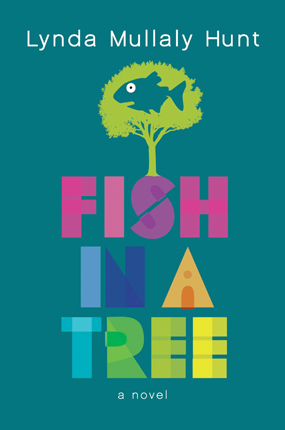| Fish in a tree Author: Hunt, Lynda Mullaly | ||
| Price: $23.08 | ||
Summary:
Ally's greatest fear is that everyone will find out she is as dumb as they think she is because she still doesn't know how to read.![]() Download a Teacher's Guide
Download a Teacher's Guide
Audio Prevew:
| Accelerated Reader Information: Interest Level: MG Reading Level: 3.70 Points: 7.0 Quiz: 172804 | Reading Counts Information: Interest Level: 6-8 Reading Level: 3.20 Points: 13.0 Quiz: 65768 | |
Common Core Standards
Grade 6 → Reading → RL Literature → 6.RL Craft & Structure
Grade 6 → Reading → RL Literature → 6.RL Key Ideas & Details
Reviews:
Kirkus Reviews (12/01/14)
School Library Journal (+) (01/01/15)
Booklist (+) (12/15/14)
The Bulletin of the Center for Children's Books (03/15)
The Hornbook (00/03/15)
Full Text Reviews:
Booklist - 12/15/2014 *Starred Review* Ally doesn’t fit in. She draws beautifully and can create movies in her mind, but she is often bullied and hides the fact that she cannot read. Now in her seventh school, she plans to pull the wool over the eyes of her sixth-grade teacher, as she has done with many other teachers in the past. But Mr. Daniels is different. He believes in Ally, insisting she is smart, and it’s almost enough to make her want to try his different way of learning. Could she actually, possibly learn to read? Filled with a delightful range of quirky characters and told with tons of heart, the story also explores themes of family, friendship, and courage in its many forms. And while a girl with dyslexia may be the center of the book, it has something to offer for a wide-ranging audience, making this an excellent class read-aloud. A hopeful and meaningful choice for those who struggle academically, this is as unique as its heroine. - Copyright 2014 Booklist.
School Library Journal - 01/01/2015 Gr 4–6—In her second middle grade novel (One for the Murphys, 2012), Mullaly Hunt again paints a nuanced portrayal of a sensitive, smart girl struggling with circumstances beyond her control. Ally is great at math, and her ability to visualize moving pictures makes her an amazing artist, but she has a terrible secret: reading is almost impossible for her. By using her wits and adopting a troublemaking persona, she's been able to avoid anyone finding out a truth she is deeply ashamed of, but a new teacher at school seems to see right through the defenses she's built. While Ally struggles to accept the help that Mr. Daniels offers, she also deals with a father deployed in the Middle East, crushing loneliness, and an authentically awful set of mean girls at school. Ally's raw pain and depression are vividly rendered, while the diverse supporting cast feels fully developed. As the perceptive teacher who finally offers the diagnosis of dyslexia, Mr. Daniels is an inspirational educator whose warmth radiates off the page. Best of all, Mullaly Hunt eschews the unrealistic feel-good ending for one with hard work and small changes. Ally's journey is heartwarming but refreshingly devoid of schmaltz.—Elisabeth Gattullo Marrocolla, Darien Library, CT - Copyright 2015 Publishers Weekly, Library Journal and/or School Library Journal used with permission.
Bulletin for the Center... - 03/01/2015 As a military kid, Ally has moved from school to school, never staying in one place long enough for teachers to see past her diversionary tactics that mask her inability to read. She’s on the same path as she enters sixth grade, but a sharp teacher penetrates her façade, recognizing her reasoning skills, visual metaphors, and quick wit as signs of a fierce intelligence hampered by dyslexia. The teacher, Mr. Daniels, earns Ally’s trust by teaching her chess and then begins tutoring her, using techniques he’s currently learning in his special education class. While the book tips into cliché at times, the familiar tropes offer easy handles for less experienced readers to hold on to as they focus on the main point: that learning differences are solvable once they’re understood properly. Moreover, each of the hyper-stylized characters offers up readable, entertaining dialogue, while Ally’s descriptions of her “mind movies” are creative and witty, saving the book from unbearable sweetness. While its best use may be as an affirming readaloud for children struggling with their own learning differences, the treatment of a group of sixth-graders with various quirks who face down their bullies extends the book’s interest beyond the immediate focus on dyslexia. KC - Copyright 2015 The Board of Trustees of the University of Illinois.



